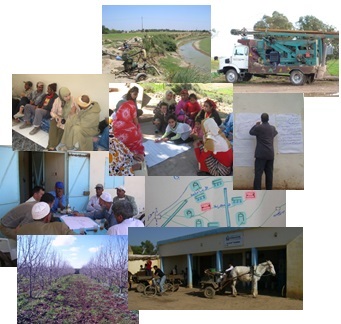Kawtar Lebdaoui
DOI: https://doi.org/10.60569/9-a2
Numéro 9, décembre 2022
Résumé
Le Maroc est engagé dans une course contre la montre pour promouvoir son économie agricole. Si les coopératives agricoles (CA) ont été au cours des deux dernières décennies l’un des outils privilégiés, leur contribution économique demeure néanmoins modeste. L’article utilise une approche qualitative pour analyser la relation entre les liens familiaux et les dynamiques de création et de fonctionnement de vingt CA au sud du Maroc. Il a pour objectif de comprendre l’impact du rapport des CA avec leur milieu social sur leurs dynamiques locales. L’enquête de terrain montre que les CA ont tendance à se constituer autour des liens familiaux, et sont exposées aux polarités politiques locales. Les prestations de l’aide publique les segmentent en clientes et victimes des élus locaux. La gestion inéquitable de l’aide publique produit des fausses CA et impacte leur pérennité. En vue d’une émancipation effective des CA, le présent papier recommande : l’analyse systématique critique des actions publiques dans les secteurs coopératif et agricole, l’assainissement des fausses CA ou leur transformation en véritables CA, et l’incitation des CA familiales à se conformer aux idéaux de la coopération.
Mots clés : Aide publique, clientélisme, coopératives agricoles, coopératives familiales, fausses coopératives
الروابط العائلية في قلب التعاونيات الفلاحية بالمغرب: أية آثار؟
ملخص
انخرط المغرب في سباق مع الزمن لتعزيز اقتصاده الفلاحي. وإذا كانت التعاونيات الفلاحية قد شكلت على مدى العشريتين الأخيرتين إحدى الأدوات الأساسية لبلوغ هاته الغاية، إلا أن مساهمتها الاقتصادية ظلت متواضعة. تعتمد هاته المقالة مقاربة كيفية من أجل تحليل العلاقة بين الروابط العائلية وديناميات خلق وسير عشرين تعاونية فلاحية جنوب المغرب، حيث تهدف إلى فهم أثر علاقة هاته التعاونيات بمحيطها الاجتماعي على دينامياتها المحلية. يبين البحث الميداني أن التعاونيات الفلاحية تنزع إلى تفضيل الروابط العائلية في تركيبتها، وأنها معرضة للتقاطبات السياسية المحلية، كما أنها تنقسم بمقتضى خدمات المساعدة العمومية إلى زبائن وضحايا للمنتخبين المحليين. إن التدبير غير المنصف للمساعدة العمومية يفرز تعاونيات فلاحية شكلية ويؤثر على استمرارها. سعيا وراء تمكين فعلي للتعاونيات الفلاحية، توصي هاته المقالة بما يلي: التحليل المنتظم والنقدي للفعل العمومي في المجالين التعاوني والفلاحي، حل التعاونيات الفلاحية الشكلية أو السهر على تحويلها إلى تعاونيات فلاحية حقيقية وحث التعاونيات الفلاحية العائلية على الامتثال لمُثُل التعاون.
كلمات مفتاحية: المساعدة العمومية، الزبونية، التعاونيات الفلاحية، التعاونيات العائلية، التعاونيات الشكلية.
Family ties within agricultural cooperatives in Morocco: what are the impacts?
Abstract
Morocco is racing against time to promote its agricultural economy. Although agricultural cooperatives have been one of the preferred means to achieve this policy over the last two decades, their economic contribution remains unsatisfactory. This article resorts to a qualitative approach to analyse the correlation between family ties and the dynamics of creation and operation of twenty agricultural cooperatives in southern Morocco. The rationale behind is to understand the impacts of the relationship that cooperatives have with their social environment on their local dynamics. The field survey displays that the cooperatives tend to be formed around family ties, and are exposed to local political polarities. Actions by public administrations to support them segment these cooperatives into clients and victims of local elected representatives. The inequitable management of public aid led to the creation of fake cooperatives and negatively impacted their sustainability. In order to achieve an effective autonomy of agricultural cooperatives, this research recommends the following : Firstly, a systematic critical analysis of public actions in the cooperative and agricultural sectors. Secondly, the reorganisation of fake cooperatives or their transformation into “genuine” cooperatives. Finally,the encouragement of family cooperatives to conform to the ideals of cooperation.
Key words: agricultural cooperatives, clientelism, fake cooperatives, family cooperatives , public aid.

